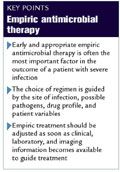What bug, which drug? Optimizing empiric antimicrobial therapy
How do you choose an antimicrobial agent wisely when the clinical situation necessitates it yet neither the pathogen nor its susceptibility is apparent? The authors organize the principles, and pitfalls, of empiric prescribing into a practical outpatient and inpatient guide.
Echezona Ezeanolue, MD, MPH; Chinenye Ezeanolue, MD; and Kevin Slavin, MD
Dr. Echezona ezeanolue is assistant professor of pediatrics, division of pediatric infectious diseases, University of Nevada School of Medicine, Las Vegas.
Dr. Chinenye ezeanolue is a resident at Newark Beth Israel Medical Center, Newark, NJ.
They have nothing to disclose in regard to affiliations with, or financial interests in, any organization that may have an interest in any part of this article.

Optimal use of an antimicrobial drug occurs when its use is based on the growth and identification of a specific pathogen from a diagnostic culture, and when the susceptibility of that pathogen to commonly used medications is known. Often, however, the clinical picture necessitates initiating therapy before culture and other lab results are available. Empiric antimicrobial therapy-treatment of a bacterial infection before the pathogen and its susceptibility to antibiotics are known-is used frequently in pediatrics, especially to treat otitis media, sinusitis, and community-acquired pneumonia. Factors that influence the decision to initiate treatment with antibiotics include a presentation that suggests bacterial infection, including nonspecific symptoms and signs, and an urgent clinical situation.1 A nonurgent clinical situation allows you to delay antibiotic therapy until decisive clinical and laboratory information is available. Delaying treatment until results of culture and susceptibility testing may be warranted in, for example, a patient undergoing a workup for suspected osteomyelitis.
The choice of an empiric therapeutic agent is informed by knowledge of what is most likely: namely, the bacterial pathogens responsible for the suspected infection and the susceptibility patterns of those pathogens. Your calculation of what may be is critical: Inappropriate initial antimicrobial therapy is associated with adverse outcomes in patients with a serious bacterial infection.2
This review will help you synthesize the principles of empiric prescribing to optimize both outpatient and inpatient treatment of infections.
Before initiating empiric therapy, you should gather important information: For example, obtain a Gram stain and collect specimens for culture from the infection site-whether blood, urine, cerebrospinal fluid, wound material, or sputum. Abnormal findings on physical examination, laboratory tests, and imaging studies help measure the severity of infection and, later, the response to therapy. In a case of cellulitis or adenitis, for example, document the size of erythema, swelling, or induration. Before treating bone or joint infection, measure the white blood cell count, C-reactive protein level, and erythrocyte sedimentation rate. Examples of useful imaging data include the size of an infiltrate on a chest radiograph and the size and quantity of fluid collections demonstrated by ultrasonography or computed tomography after surgery for ruptured appendix.
Note: Whenever you formulate a plan for instituting empiric antimicrobial therapy, consider that the expertise of an infectious disease specialist is usually necessary in a complicated, rare, or severe infection or when a patient is immunosuppressed or has a comorbidity or an unusual syndrome or exposure. Clostridium difficile toxin isolated in an otherwise healthy patient with diarrhea, for example, may pose little risk, whereas a patient undergoing chemotherapy who has diarrhea caused by C difficile is at risk of toxic megacolon. Ideally, consultation should occur early in the course of treatment.